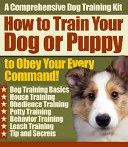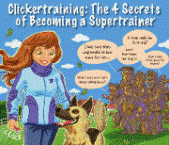Good Dog Training Advice
Get Fast & Simple Dog Training Tips to
Turn a Difficult Dog Into an Obedient Pet!
Secrets to Training Older Dogs(Scroll down to see the full list of lessons in this section)
A lot has been said and quoted about not being able to teach old dogs new tricks, but in reality, it's not
necessarily impossible.
While tougher than training a pliable, eager to please puppy, an older dog is just as capable of learning new
commands as any other dog.
Consider the human mind. How much easier is it for us to learn when we are just children? Six year olds can be fluent in multiple languages, but if you or I tried to sit down and learn French right now it would take years to master it. The same is true for dogs. The brain gets set in its ways and it takes quite a bit of extra effort to learn something new when you're that much older. But, it's not impossible - not by a long shot. In fact, there are some reasons that training an older dog might even be a bit easier. To start with, they're calmer. They have less energy and a longer attention span. Plus, they likely already know the meaning of the word "no" and how to tell when you're upset. Ideally, they should also understand that you are the pack leader and that they should accept your leadership up front. Training Your Older Dog So, with all that in mind, there are some situations in which you may need to test your patience and the attention span of your older dog and get them to learn new behaviours or even tricks.
* House
Training - The only time you may need to house train an older dog is if you bring home a
rescue or adopted dog that has never been in a home before. In this case, you get the benefit of a larger
bladder and calmer dog.
However, with a new location, strange people and food change, it will take some time to teach your new dog exactly what they need to know. You'll need to take your dog out frequently at first, making sure you praise them when they go outside. * Crate Training - Older dogs can be harder to train in a crate because of associations they may have with small spaces. Get your crate and put it in a quiet space where there is less foot traffic. Then, cover it partially with a towel or cover and then give him some toys and something to sleep on. Now, leave the door open and let your dog discover it. Many times, a dog will figure out that it is a bed and start using it immediately, crate training themselves. Even if they do not, however, you can help them adjust by giving them extra attention while in the crate. * Obedience Training - If your dog needs basic obedience training, you may want to consider a class to help you get it done. You'll need to use a basic reward based system (I don't recommend chokers or training collars). You'll need to isolate a behaviour in your dog, such as sitting, laying down, or speaking, and then reward it whenever you give a command. If you use a clicker, you can reduce the treats you use and have the clicker substitute for the command and reward sequence. Training an older dog may seem like a trying experience, but in reality it is no harder than training a puppy, just different. While puppies are easy to control and small, they are also less patient and more easily distracted. A larger, older dog will listen more attentively and will generally want to please you. Tap into that and be patient with them and you'll find them as easy to train as any other dog you've ever dealt with. One way to make older dogs live longer and more healthily is to give him or her the right foods that are best for them.
Here is a website that contains some of the best dog food recipes that I've ever seen:
==> http://gooddogtrainingadvice.com/healthydogfood.html <== Secrets to Training Older Dogs | How to Train Older Dogs:
Secrets to Training Older Dogs | How to Train Older Dogs | |
|


Discover the Secrets to Training Your Dog Or Puppy. Huge BONUSES for a limited time only!
Click here now...
|
http://GoodDogTrainingAdvice.com







